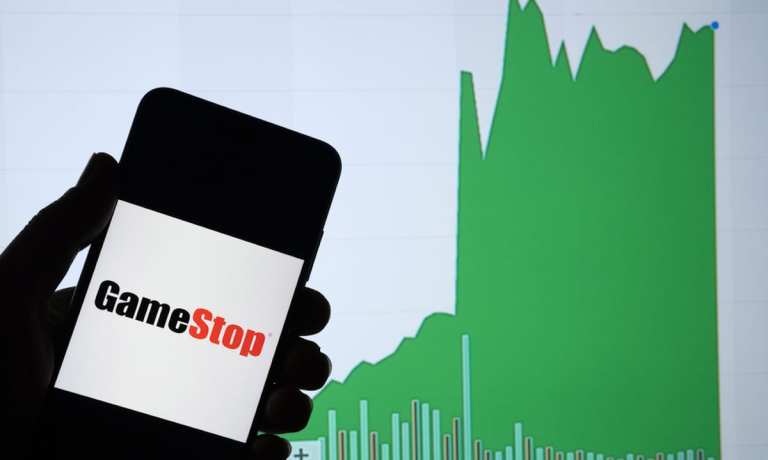GameStop: Brokers, Regulators Try To Stop Wild Trading, Raising Ire Of Small Investors

It almost seems like a set up to a punchline: What do AOC and Ted Cruz have in common?
Until yesterday, the answer would have been pretty much nothing. But now, thanks to the unavoidable attention brought on by 300+ percent intraday trading swings in shares of video game retailer GameStop, the hard left and hard right politicians have found common ground in the need to defend small investors.
“This is unacceptable,” Democrat Congresswoman Alexandria Ocasio-Cortez tweeted. “We now need to know more about Robinhood’s decision to block retail investors from purchasing stock while hedge funds are freely able to trade the stock as they see fit. As a member of the Financial Services Committee, I’d support a hearing if necessary.”
The comments came after overnight decisions by Robinhood, and at least one other trading platform, to restrict further purchases in shares of GameStop, which have gone from $3 to nearly $500 in less than six months, with no material change in their underlying unprofitable business.
Piling On
In much the same manner as small investors piled onto investor chatroom directives to purchase shares of GameStop, other lawmakers, stock exchanges and regulators are now lining up to take a closer look at the unprecedented volatility.
Before the markets opened in New York on Thursday (Jan. 28), financial platform Robinhood updated its users — 50 percent of which are estimated to own Gamestop shares — that it was changing the rules.
“We continuously monitor the markets and make changes where necessary. In light of recent volatility, we are restricting transactions for certain securities to position closing only,” a company notice stated — a move that put GameStop and a dozen other companies on the restricted list, many of which have faced similar sneers from traditional Wall Street investment firms.
Stocks on the list include: American Airlines, AMC Theaters, Blackberry, Bed Bath and Beyond, Castor Maritime, apparel company Express Inc, headphone-maker Koss, Naked Brands apparel and swimwear, Nokia, Canadian cannabis firm Sundial Growers, Tootsie Roll and Travigo, a German subsidiary of Expedia.
“In the interest of mitigating risk for our company and clients, we have put in place several restrictions on some transactions in GameStop, AMC Theaters and other securities,” TD Ameritrade said, noting that such measures are not uncommon. “We have been adjusting our requirements for several days as we continued to see trends indicating unusual volume in an unprecedented market environment, which appear to be divorced from traditional market fundamentals. We have made what we believe to be prudent and appropriate decisions to place some limits on certain transactions for certain securities.”
Who Are the Moves Protecting?
By most accounts, the only investors that have been hurt (so far) by the meteoric rise of GameStop are large, sophisticated hedge funds that had been shorting the stock (or betting that it would decline) and have since been forced to go into the market and buy shares at inflated prices to close out their trades and stop their losses.
On the other side of the trade, small individual investors who follow the Reddit chatroom group WallStreetBets have been defiantly bucking conventional wisdom and pushing the stock higher.
“Individual investors are being stripped of their ability to trade on Robinhood. Meanwhile, hedge funds and institutional investors can continue to trade as normal,” noted a WallStreetBets Twitter user known as WSB Mod. “What do you call a market that removes retail investors’ ability to buy to save institutional investors’ shorts?”
Despite these interventions, as of midday Thursday (Jan 28), Gamestop shares had traded at as low as $112 and as high as $482, after closing at $347 on Wednesday.
“We are aware of and actively monitoring the ongoing market volatility in the options and equities markets and, consistent with our mission to protect investors and maintain fair, orderly and efficient markets, we are working with our fellow regulators to assess the situation and review the activities of regulated entities, financial intermediaries and other market participants,” noted a statement from the Securities and Exchange Commission (SEC).
On Wednesday (Jan. 27), Wedbush Analyst Michael Pachter, who has covered GameStop for years and, as of Jan. 11, rated the stock “neutral” with a $16 price target, told Yahoo! Finance that he was as mystified as everyone else. “It means nothing for the company,” Pachter said. “I mean, I guess it’s fun to be a cult stock and it’s fun to have a lot of people talking about you, but they’re not going to do anything differently because their share price went way up, other than perhaps issue a little bit of equity and pay down some debt.”
Read More On Stocks:
- FinTech IPO Index Up 3.8% as Lemonade Surges on UK Expansion
- What We’ve Learned Tracking the 100 Connected Economy Leaders Since 2022
- Report: Stripe Valued at $70 Billion Amid Possible Sequoia Deal
- FinTech IPO Index Surges 3.5% on Partnership Announcements Ahead of Earnings Season